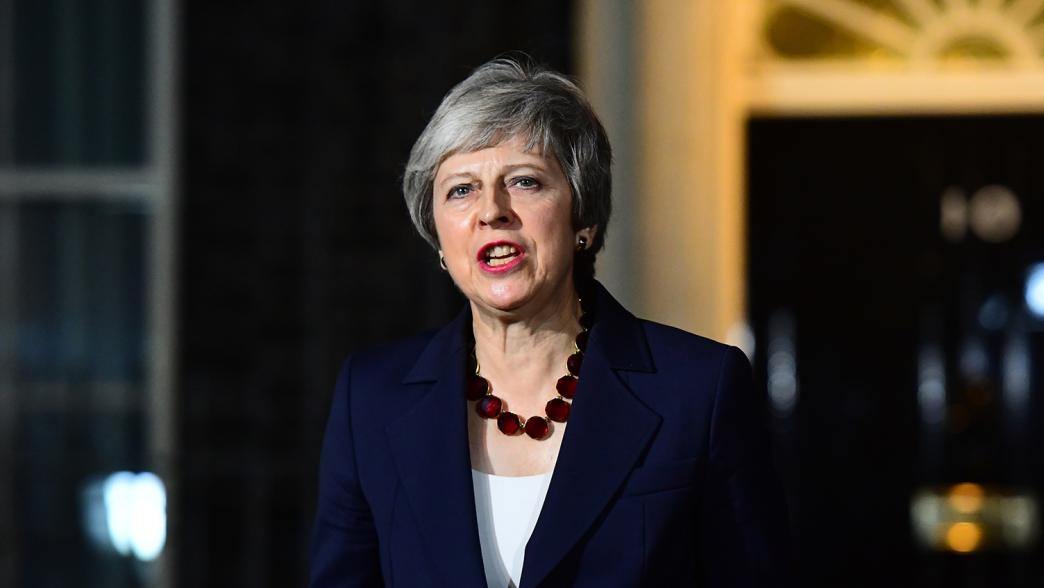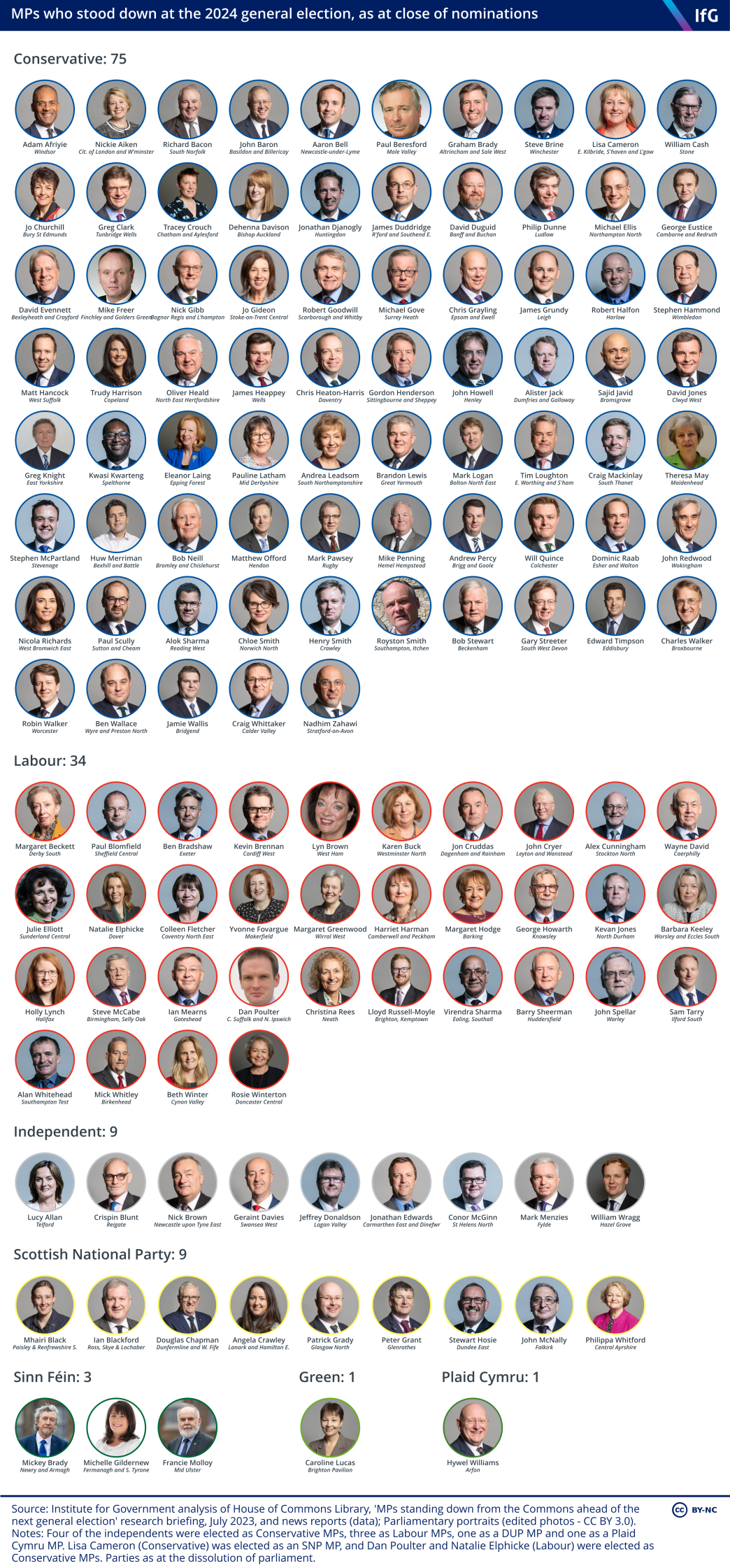MPs who stood down at the 2024 general election
How many MPs stood down at the general election, and why?

How many MPs stood down at the election?
In total, 132 MPs chose not to stand again at the general election on 4 July.
A number of prominent MPs stood down, including 22 current and former secretaries of state. Former prime minister Theresa May, former deputy prime minister Dominic Raab and current levelling-up secretary Michael Gove all stood down, as did former Labour ministers Harriet Harman and Dame Margaret Hodge. They were joined by the former Westminster leader of the SNP, Ian Blackford, two current deputy speakers, Dame Rosie Winterton and Dame Eleanor Laing, and the chairs of 10 select committees.

Which parties did they belong to?
Most of the MPs who stood down are Conservatives – 75 of the total 132 MPs. In addition, four of the nine independent MPs who retired were first elected as Conservatives. This is unsurprising, as there were more Conservative MPs than MPs for any other party in the 2019–24 parliament.
Other parties also saw significant turnover. The nine SNP MPs who stood down equate to more than a fifth (21%) of the parliamentary party in the last parliament, only marginally behind the Conservatives’ 22%. The Green Party’s sole MP, Caroline Lucas, also announced she would not stand in the election, as did Hywel Williams, one of only three Plaid Cymru MPs.
How many MPs usually stand down at general elections?
The 2010 election saw almost 150 MPs stand down, mainly from the Labour Party, which had been in power since 1997. Some of these MPs had announced that they would stand down in response to the expenses scandal of that same year.
Similarly, 117 MPs stood down at the 1997 election, mainly from the Conservative Party – with the large Labour poll lead at the time a significant influence on these decisions.
If the election is unexpected, MPs have less time to consider whether to stand down – something that will have contributed to higher numbers of MPs standing down in 2010 and 2015 than at the snap elections of 2017 and 2019.
How long had the MPs who stood down been in the Commons?
Conservative MPs who stood down were most likely to be from the 2010 intake, as the party gained a lot of MPs at that election: almost 25% of Conservative MPs in the 2019–24 parliament were drawn from that cohort. Most SNP MPs who stood down were from the 2015 intake for similar reasons, with more than two-thirds of the party’s MPs elected in that year.
However, 17 MPs from the 2017 and 2019 intakes stood down too, despite a relatively short period in parliament. This included MPs who won seats in traditional Labour strongholds, like Dehenna Davison, the MP for Bishop Auckland, and Nicola Richards, the MP for West Bromwich East.
Why did MPs stand down from parliament?
Some MPs retired from politics after having had long careers in the Commons. Barry Sheerman, the oldest sitting Labour MP, retired after 45 years in parliament. Similarly, Harriet Harman, the longest serving female MP at the time of dissolution, left the Commons after four decades in office.
Many of those who stood down, however, are comparatively young. SNP MP Mhairi Black, once parliament’s youngest MP and still in her 20s, is not standing for election again. Other relatively young MPs stood down despite having become ministers, like Dehenna Davison, or select committee chairs, like Robin Walker, during the course of this parliament.
Many MPs cited personal reasons for standing down, like mental health struggles or a desire to spend more time with their families. Others have been critical of parliament itself. Black, for instance, described Westminster culture as “outdated, sexist and toxic”. 21 Cochrane A, ‘Mhairi Black to step down as SNP MP at next election’, BBC News, 4 July 2023, www.bbc.co.uk/news/uk-scotland-66101123 Stuart Anderson said threats against his family had influenced his decision not to seek re-election in Wolverhampton South West 22 Collins R and Glinka E, ‘Two Conservative Black Country MPs to step down at election’, BBC News, 28 March 2023, www.bbc.co.uk/news/uk-england-birmingham-65097041 , although he was subsequently chosen as a candidate for South Shropshire instead. 23 Dawkins A, ‘MP Stuart Anderson selected as candidate in different area’, BBC News, 25 July 2023, www.bbc.co.uk/news/uk-england-shropshire-66300464
Some MPs’ decisions may also have been prompted by the changes to constituency boundaries which will take place at the election, which have meant they may have faced a difficult reselection battle or needed to find a new constituency altogether. For instance, Jonathan Djanogly, MP for Huntingdon, announced he was standing down after he was unsuccessful in securing automatic re-adoption as a candidate in a new seat. 24 Atkinson W, ‘Djanogly de-selected in Huntingdon. Once again, boundary changes proved the crucial factor’, Conservative Home, 4 April 2023, https://conservativehome.com/2023/04/04/djangoly-de-selected-in-huntingdon-once-again-boundary-changes-proved-the-crucial-factor/ Likewise, Labour MP Mick Whitley stood down after losing a selection contest to shadow minister Alison McGovern.
Others may have been blocked from standing again by their party executives. The independent MP Geraint Davies announced he was unable to run as a Labour candidate as a hearing had not yet been held into anonymous allegations against him. Likewise, Labour MP Lloyd Russell-Moyle was blocked from standing following an unspecified allegation about his behaviour.
Finally, some MPs might simply have been sceptical of their chances of winning re-election. Many of the announcements from Conservative MPs came in the past year, during which time Labour has enjoyed a sustained poll lead. Departing SNP MPs may have been similarly influenced by the party’s decline in the polls throughout 2023.
Do MPs ever reverse their decision to stand down?
Occasionally MPs may reverse their decision. Suspended Conservative MP Julian Knight announced he would be standing down in April 2023 but reversed this decision on 31 May 2024, choosing to run as an independent candidate in Solihull West and Shirley. Andy Carter also reversed his decision to stand down from his seat of Warrington South after failing to be selected for a safer constituency. 29 Tomorrow’s MPs, tweet, 31 May 2024, https://twitter.com/tomorrowsmps/status/1796657590635581817
MPs may also seek selection in another seat despite having announced that they are standing down. Five Conservative MPs were selected for new seats despite having previously announced that they were standing down: Stuart Anderson, Stuart Andrew, Chris Clarkson, Kieran Mullan and Douglas Ross.
A handful of other MPs also sought selection in new seats in the weeks before the deadline for nominations. Jamie Wallis, 30 Tomorrow’s MPs, tweet, 17 May 2024, https://twitter.com/tomorrowsmps/status/1791603715754918051; Tomorrow's MPs, tweet, 23 May 2024, https://twitter.com/tomorrowsmps/status/1793715365316571295 Nicola Richards 31 Tomorrow’s MPs, tweet, 30 May 2024, https://twitter.com/tomorrowsmps/status/1796294714511294822 and Lisa Cameron 32 Tomorrow’s MPs, tweet, 31 May 2024, https://twitter.com/tomorrowsmps/status/1796611564700659826 (all Conservative MPs) all unsuccessfully attempted to gain selection in new seats in late May.
Do MPs get paid once they stand down?
All MPs continue to receive their salary up to and including polling day. The additional salary for chairs of select committees stop at the date parliament is dissolved.
After an election, all those who cease to be an MP will receive a winding-up payment, equivalent to four months salary. Those who stand down are not eligible for an additional loss of office payments that MPs who lose their seat or stand unsuccessfully in a different seat receive.
How do MPs close down their offices?
Separate to the winding-up payment described above, departing MPs are entitled to claim for winding-up costs, to ensure that they can properly close down their offices. The winding up period covers the four months from the day after polling day. During this time MPs can continue to claim from their budgets for costs including staff salaries, travel costs, office lease costs, and data disposal costs. The pro-rated budgets are announced the day after polling day. MPs then need to provide an explanation of why the costs were incurred during the winding up period in order to claim.
The rules previously only applied to MPs who were not re-elected but after the repeal of the Fixed Term Parliament Act all MPs leaving parliament, from the 2024 election, are entitled to claim for winding up costs.
MPs will also need to issue redundancy notices to their staff. This is because MPs’ staff are employed by the individual MP, not by parliament, so when an MP stands down their staff are made redundant.
Which seats did MPs stand down from?
- Political party
- Conservative Labour Liberal Democrat Green Party Scottish National Party
- Administration
- Sunak government Blair government Brown government Cameron government Cameron-Clegg coalition government
- Legislature
- House of Commons
- Public figures
- Kwasi Kwarteng Dominic Raab Gordon Brown Ben Wallace
- Publisher
- Institute for Government